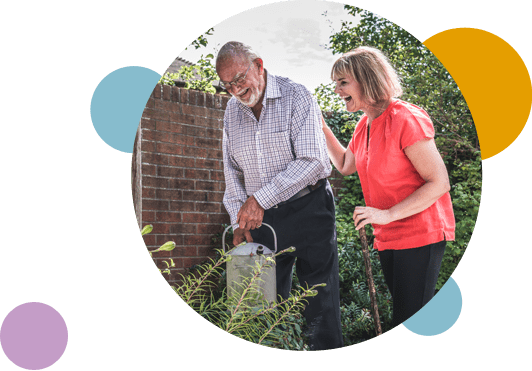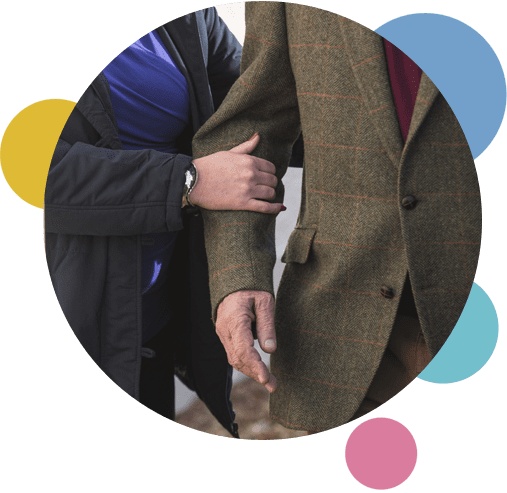Preventing falls
Maintaining independence by preventing falls
Whilst anyone can have a fall, older people are more vulnerable with a higher chance of falling, particularly if they are living with an on-going health condition or are impacted by mobility/frailty issues. Falls in older people are common – in the over 65s, one in three adults will have a fall in their home at least once a year. Half of these people will have frequent falls. Whilst most falls do not cause serious injury, the impact of falling can lead to broken bones and can have a detrimental impact on a person’s confidence, which in turn affects their independence. It is therefore important that risks are assessed, and a plan put in place that ensures you are preventing falls.

Preventing falls – understanding why you might fall
There are several reasons and conditions that cause an older person to fall:
- Muscle weakness that naturally occurs in older age
- Stiff joints caused by conditions like arthritis
- Conditions like Parkinson’s and dementia present a greater risk of falling
- Tiredness experienced in older age
- Effects of medication
- Changes in blood pressure
- Heart conditions
- Problems with hearing that affect your balance
The NHS has a useful falls risk assessment which can help with preventing falls.

What you can do to help with falls prevention
It is important in preventing falls that you do some simple things regularly that can reduce the risk:
Hearing and sight check
You should have a hearing and sight check regularly, at a minimum every two years. This will identify any problems that could affect your balance and overall health.
Eat a balanced and nutritious diet
Ensure that you have a well-balance diet that is focused on keeping your bones strong as this will help with preventing falls. Food rich in calcium, such as milk and cheese should be consumed as part of your diet, as well as oily fish like tuna or sardines as they contain Vitamin D whkoich promotes bone strength.
Keeping mobile and exercising
Making sure you keep physically active and take part in moderate frequent exercise is a good strategy for preventing falls in older people. Exercise improves muscle strength and overall balance. Walking and swimming are good exercises for those in their later years, with many profound benefits. It is advisable if you have not exercised in a while that you consult your GP first.
Chiropody care
Make sure you keep your toenails trimmed so that you do not have any problems that could affect your balance.
Preventing falls at home
There are several measures you can take in and around your home that will avoid falls by reducing the risks:
- Organise your home, so you do not need to unnecessarily climb, bend or stretch.
- Never use chairs to stand on to get something from up high – invest in a suitable step ladder or get someone to help you.
- Rugs or frayed carpet can cause you to trip and fall. Make sure you use a non-slip mat under all rugs and keep on top of carpet care.
- Ensure you do not have any electrical cables that are visible that could trip you over.
- If you spill something in the home, make sure it is mopped up immediately.
- Declutter your home especially areas, like hallways that you travel through often.
- Ensure your home is well-lit.
Home is best for preventing falls
We understand the challenges people face in older age and we have been caring for people and preventing falls for over 10 years. Receiving high-quality care and support in the safety and familiarity of your own home from a trained professional carer has far reaching benefits in maintaining independence and over well-being to those who a prone to falling. Hip fractures are the most common injury sustained through falling. According to a survey by the Live-In Care Hub in 2017, a person living in a care home has a 3.2% chance of having a hip fracture within any one year compared to a person who is receiving live-in care who only has a 1.7% chance. One-to-one personalised care simply cannot be achieved in a care home.
Why choose The Good Care Group?
We have been providing high quality, live-in care to families in England and Scotland for over 10 years. At the heart of our award-winning service is enabling people to live independently in their own home with an improved quality of life. Our approach to care at home means our clients can achieve improved health and well-being. For families they benefit from peace of mind and reassurance that their loved one is receiving the very best care and support.
A perfectly matched care team
A live-in care service usually involves two carers working a two-week rotation. They will be carefully matched working with you and your family. We make sure they are skilled and equipped to meet all your care and support needs. Our focus on matching means the chosen care team shares common interests and backgrounds. We know this means life is enjoyable for everyone. Your care team really gets to know you and your needs, which means you get the consistency of care.
Expertly trained carers
All our professional carers are required to complete our leading training programme before they care for our clients. Our programme has been created with leading charities and clinical experts. It goes beyond mandatory requirements in the care sector. Carers are then equipped to provide high-quality care and support for those living with specialist conditions. Our carers never stop learning new skills to further enhance the care they provide.
Continuity of care
Unlike an agency we employ our carers. This means they are committed to us, as we are to them. Carers enjoy the security of being employed, which means they stay with us longer. Those who work for agencies move around more. For families this means that you get continuity and consistency of the same care team caring for your loved one. This means high-quality care can be achieved with improved outcomes and no disruption to your loved one’s life.
In-house clinical experts
We have a dedicated team of in-house clinical experts. This includes a specialist consultant nurse, who also provides admiral nurse services to those living with dementia. Our management team consists of nursing professionals. They guide our carers to provide safe and effective nurse-led care at home. We also have our own in-house Occupational Therapist (OT) who works closely with healthcare professionals and our care teams. Our OT provides guidance and advice that enables people to live well in their own home with any equipment they may need. These experts lead, monitor and support our care teams to deliver best practice nurse-led care at home.
Innovative care technology
Unlike any other live-in care provider, we have our own online care community. Families, healthcare professionals and carers can access up to date information about the care being provided. It enables more effective monitoring, which means issues can be responded to efficiently. For our families it provides a reassuring window into the care their loved one is receiving. Our carers also use the online community to share ideas and support each other. It provides a vital connection which is important when remote working. Carers will use the online community so their clients can enjoy time online. This includes video calls with family, so they feel connected. Clients can use it to shop online or browse the web.
Improving health outcomes
Every decision we make is driven by delivering improved health outcomes for our clients. Our digital technology allows us to predict risk and shape the care we provide. We measure health outcomes.
We want to know we are improving the quality of our clients’ lives every year.
Our health and well-being aim to reduce:
- Behaviours that challenge
- Antipsychotic drugs in dementia care
- Falls in the home
- Hospital admissions
- Readmission to hospital
- Urinary tract infections (UTIs)
- Chest infections
- Carer stress
- They aim to promote:
- Independence
- Well-being
- Excellent nutrition and hydration
- Enjoyment in life
Highest service rating from care regulators in England and Scotland
Unlike introduction agencies we are fully regulated in England and Scotland. This means the care and support we provide is regularly inspected. We are the only dedicated live-in care provider in England to achieve an ‘Outstanding’ rating by the Care Quality Commission (CQC). We have achieved this rating in all five measures – safe, effective, caring, responsive and well-led. In Scotland, our service has been inspected by the Care Inspectorate (CI). It has achieved the highest rating of a 6 (Excellent) for quality of care and support and 5 (very good) for staffing, management and leadership. We know this provides families with peace of mind that their loved one is receiving the best possible care.
A fully managed service
Families benefit from our fully managed service delivered by care experts. This means you do not need to worry about supervising and managing the carer looking after your loved one. Our professional carers are supervised by an experienced care manager and supported by clinical experts. We provide this support 24 hours a day, 7 days a week. Your dedicated care manager will be on hand to support you, your loved one and our carer teams. We invest in our care management team to ensure they have enough time to give the support everyone needs. With our fully managed service, families do not have the burden of managing the care arrangement themselves. We know this means families can have peace of mind, whilst enjoying quality time with their loved one. They do not have to worry about the tasks of caring.
Local teams with national coverage
We operate throughout England and Scotland with a local approach to management of our teams near you. Each dedicated care manager local to you has only a small number of clients to support. This means they can provide higher levels of monitoring and support than other home care providers. It also means a highly personalised approach to care can be delivered.
Talk to us about your care needs
Find out more about how we can help you to prevent falls in the home – call us today.
